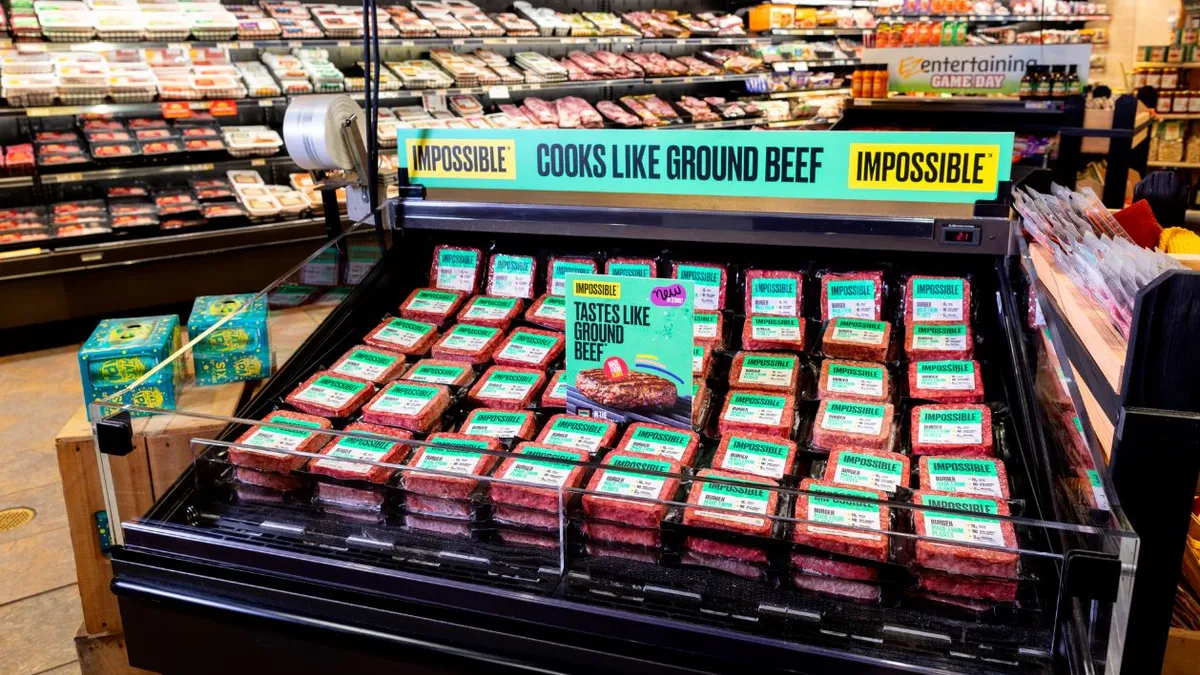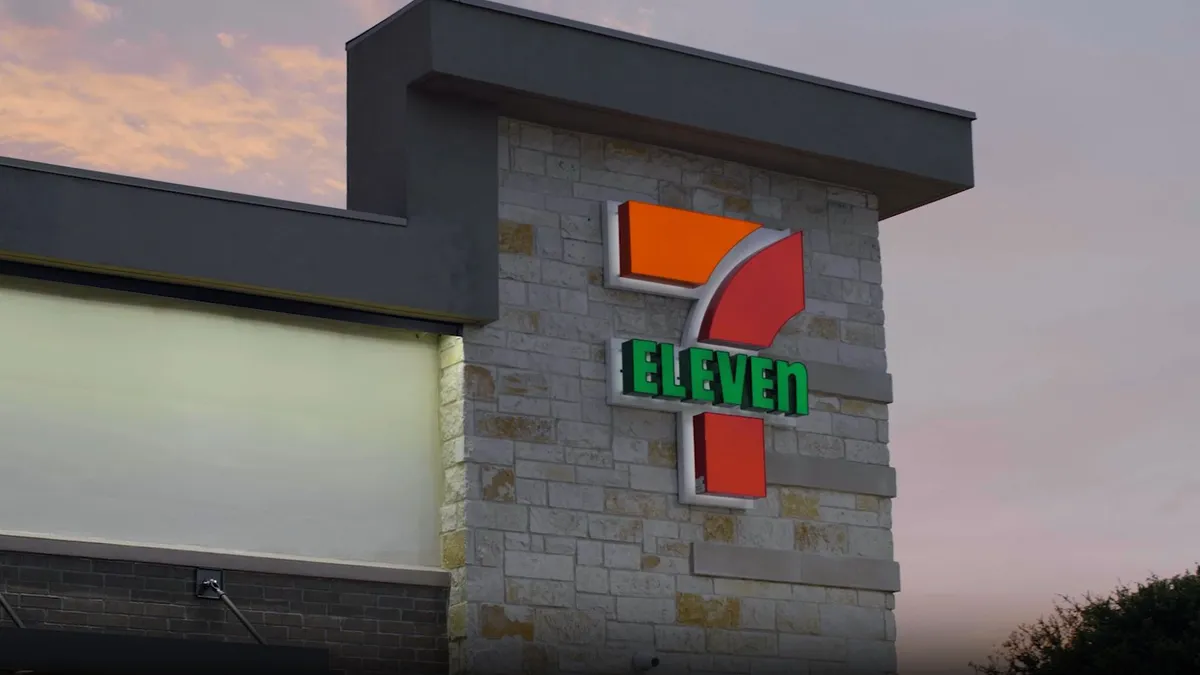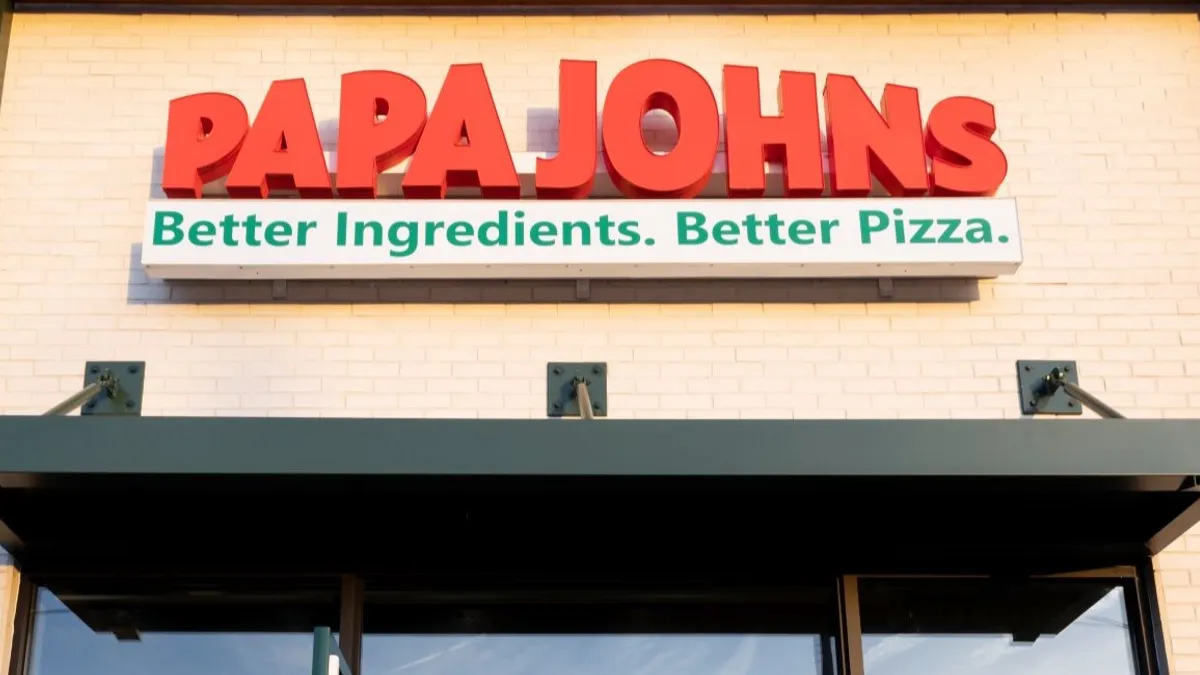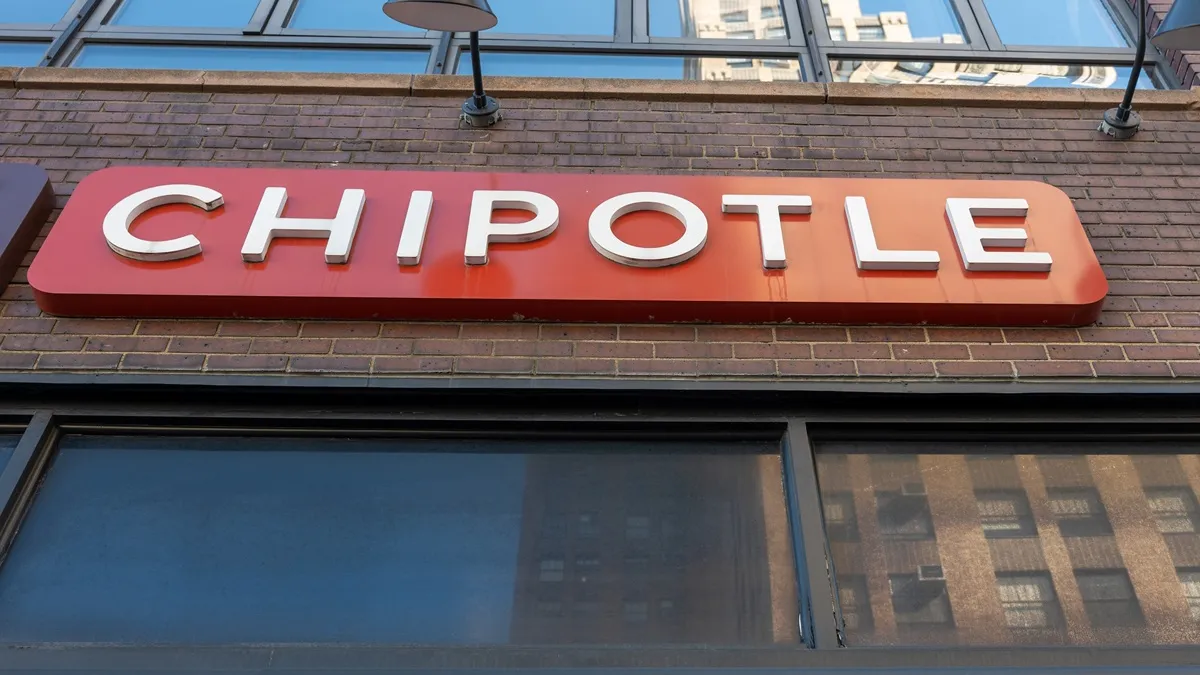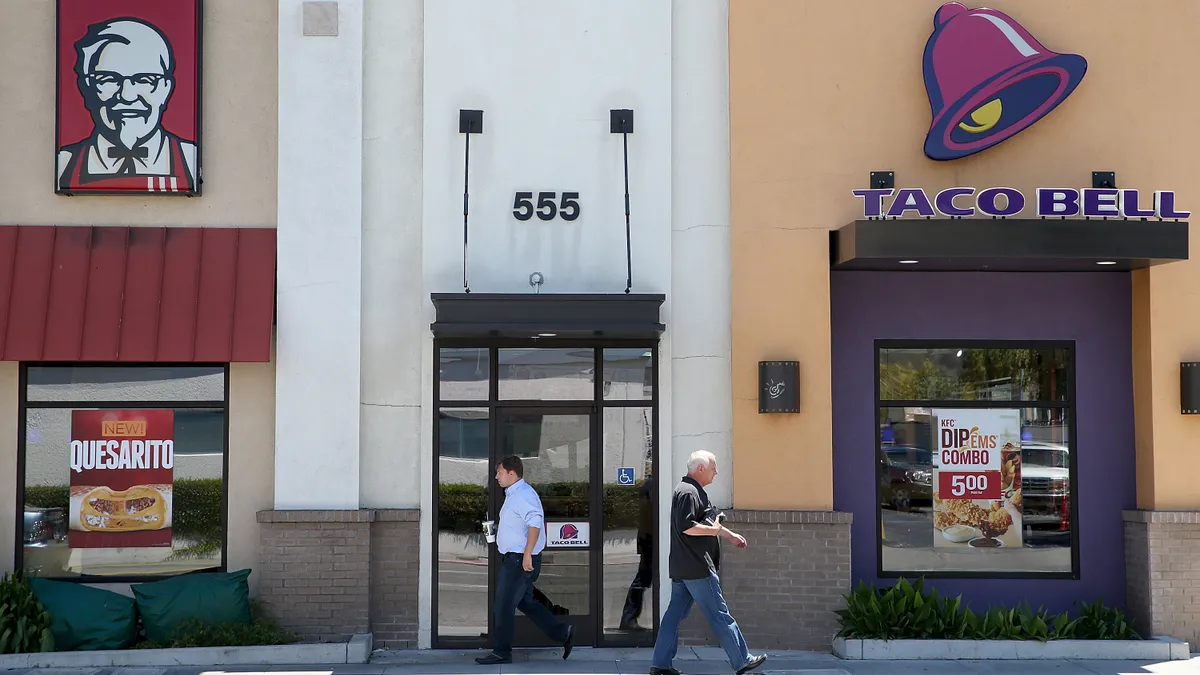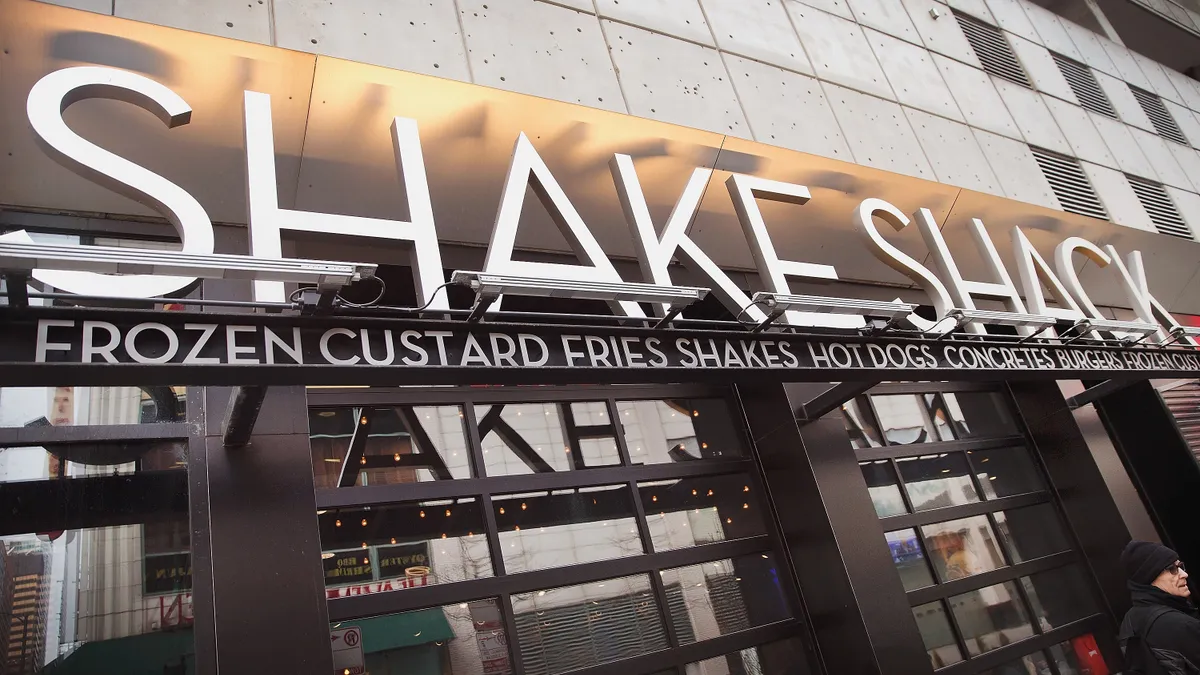Impossible Foods CEO Pat Brown doesn't hide the fact that he's out to eradicate the meat industry. He just wishes that his competitors in the plant-based meat segment would do more to help.
In an interview with Food Dive, he said the influx of companies delving into plant-based products shows momentum is building to find alternatives for carnivores, even if they are not actively looking to make the switch from meat. He acknowledged this bar is a difficult one to clear without the right blend of taste, nutrients, convenience, affordability and performance.
A marathon runner who hasn't had a traditional hamburger since 1976, Brown said Impossible Foods doesn't "view any of those guys as competition." He said if someone wants to buy another plant-based product, "they should just do it."
"The only negative is that most of those products, to be honest, tend to suck, and I think that hurts us," Brown said, not specifying a company or product when asked a follow-up question. "The best thing they could do for us is make better products because every time someone who hasn't tried our product tries one of those products, it reinforces the idea that plant-based meat replacements are terrible."
The company is targeting the lion's share of individuals who purchase meat. It's part of Impossible Foods' broader effort to curtail animal farming that the outspoken Brown said is "categorically the most destructive in the world" and "racing us toward environmental catastrophe" through its use of water, fertilizer and land — as well as its impact on greenhouse gases. His long-term ambition is to eradicate animal agriculture and deep-sea fishing by 2035.
Struggling to meet demand
The plant-based meat market is expanding at an impressive clip. Sales climbed 42% between March 2016 and March 2019, when they reached $888 million, according to Nielsen data reported by the Associated Press. Euromonitor predicts the market for plant-based meat substitutes will reach $2.5 billion by 2023.
First introduced in 2016, the plant-based Impossible Burger is currently sold in more than 17,000 restaurants, including White Castle, Red Robin and 7,200 Burger King locations. Impossible started making its way into retail in September with its debut in 27 Gelson's Markets stores in Southern California, a pair of Fairway Markets in New York and 100 Wegmans locations on the East Coast.
Earlier this year, Impossible Foods struggled to meet rapidly growing demand, leading to a shortage of the product for some of its restaurant customers. Brown said buyers were generally patient and understanding, but he acknowledged it created a hardship for some businesses with a product on their menu that they couldn't deliver to customers.
Some restaurants even stopped carrying the brand, but Brown said Impossible Foods expects to regain their business "once we can assure them that we got them covered."
"The only negative is that most of those products, to be honest, tend to suck and I think that hurts us. The best thing they could do for us is make better products, because every time someone who hasn't tried our product tries one of those products, it reinforces the idea that plant-based meat replacements are terrible."

Pat Brown
CEO, Impossible Foods
The shortage has since been alleviated, according to the company. Impossible Foods added a third shift of workers and installed a second production line at its manufacturing plant in Oakland, California. In July, the company partnered with OSI Group, a manufacturer of meat patties for fast-food restaurants, to give Impossible access to additional manufacturing capacity.
Even though Impossible had planned for massive demand, Brown said they let their customers down.
"It greatly exceeded our plan, and we had to catch up. We're never going to do that again. That's the point," Brown said, sporting Impossible Foods socks, a T-shirt with a cow behind a universal no sign and a gray sport coat. "We're not going to make commitments to new customers until we know we have excess capacity to satisfy them."
Brown said Impossible Foods delayed its nationwide launch with Burger King because the company wanted to make sure it could get existing customers supplied before they took on something of that scale. It also held back on its retail launch date for the same reason.
Timing of an IPO
While much of the attention on Wall Street this summer was focused on Beyond Meat and its wildly successful IPO, Impossible Foods has been actively raising its own cash to fuel expansion efforts. In May, the company raised $300 million in an investment round backed by celebrities including Jay-Z, Katy Perry and Serena Williams. Since the company was founded eight years ago, it's raised more than $775 million in five funding rounds. After the latest round, Impossible Foods is valued at $2 billion, according to Reuters.
Brown said the plant-based meat company doesn't need the distraction attached to a Wall Street listing right now.
"We have no immediate plans for an IPO," Brown said. "There is a pretty high likelihood that at some point in our history, we will decide that that's worth doing. Right now, we have the funding that we need. We have great investors and our priority is just to focus on doing our job to grow our business, to develop new products, to make sure we have robust supply chain manufacturing."
Critics are 'getting a little desperate'
Increasingly, plant-based manufacturers like Impossible Foods are directing more of their attention toward rebuffing criticisms that have recently dogged the space.
One of them is the use of the word "meat." Mississippi, Missouri, Arkansas and several others have passed laws prohibiting meat-related terms on plant-based or cell-cultured products. Opponents have argued that plant-based products have been sold at retailers for years, but only attracted opposition as alternative meats gained popularity — a point echoed by Brown.
"It's a very good sign that the incumbent industry realizes that they're seeing that their future is questionable and they're getting a little desperate," Brown said. "We're creating products that, in terms of delivering what consumers want, are serious competition. And we're getting better every day, and they can't improve at all. (Meat producers are) seeing basically the future of the meat industry coming their way, and it's not them."
Brown also downplayed attacks on the lengthy list of ingredients commonly used to make plant-based products, which seems to contradict the clean label trend. While traditional meat has only one ingredient, Impossible Foods' burger has 21 — including the lab-chemical-sounding methylcellulose to hold the product together, and heme, an iron-containing molecule made by fermenting genetically modified yeast that gives the uncooked product its red color.
Impossible Foods is forthcoming about its long ingredient list, putting information about the burger's components prominently on its website, Brown said. The Impossible Burger isn't alone with its lengthy ingredient list. Beyond Meat's Beyond Burger has 22 ingredients.
Brown called criticism levied against his product's ingredient makeup "bogus." He said the company has been "extremely transparent about it, beyond what we need to be."
"It's not in our interest for consumers to be confused about what our product is. We have abundant data that says that meat lovers meat for its flavor, for its protein, for iron, for its versatility, for all those sorts of things. They absolutely do not love ... the fact that is comes from animals," Brown said. "It's advantageous for us that as long as we can deliver the sensory pleasures, the deliciousness, the nutritional value and make a product that is healthy, consumers would prefer it to be made from plants. It would be crazy for us to hide" what's in the product.



